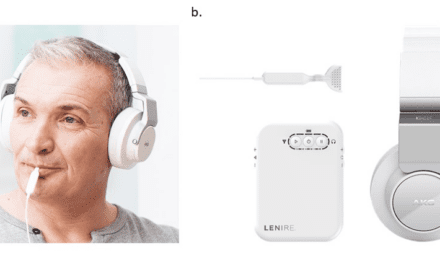10-31-2006
A major science prize was awarded to a researcher who is looking for the region of the brain that helps us to hear someone in a noisy place, such as a party or bar, and is responsible for “training” the brain to hear better in these situations.
Not being able to hear a person’s voice in a noisy room and follow conversations is one of the most common problems for Britain’s nine million people with a hearing impairment.
Deafness Research UK has awarded the 2007 Pauline Ashley Prize to Sam Irving, a young researcher at the MRC Institute for Hearing Research in Nottingham.
The Pauline Ashley Prize, established in memory of the charity’s founder, Lady Ashley of Stoke, is awarded annually to a talented young scientist near the beginning of their career and undertaking research into deafness, or a related condition such as tinnitus.
Most people with a hearing impairment have trouble picking out what someone is saying when they’re in a noisy room. Parties or bars are some of the worst places because the level of background noise is high, and so scientists call this the “cocktail party effect.”
To see what this was like, Irving wore an earplug in one ear for a week, which gave him a one-sided hearing loss.
“It was hell—especially when I was in the pub with friends,” he says. “The background hubbub of the bar seemed to be the same level as the people I was talking to so I could barely hear what they were saying and it took a huge effort of concentration to follow any conversation. During the week, I gave up and spent a lot of time at home on my own because it was so distressing and tiring to be with lots of people or in a noisy place.”
Our ability to detect a particular sound in the middle of lots of noise relies on the fact that we have two ears, and each detects an individual sound at a slightly different time (a sound coming from the left will reach the left ear slightly faster than it reaches the right ear). This is known as binaural or “spatial” hearing because it helps us identify where a sound is coming from and to concentrate or focus our hearing on that particular sound.
But, if you have some form of hearing problem in at least one ear, this ability is disrupted and the brain struggles to tell one sound from another.
The key to understanding this ability lies in the brain. Scientists are currently trying to work out exactly what part of the brain is responsible and how it allows us to distinguish one sound from lots of noise. Early research has had some remarkable results.
Most mammals also have this ability and in 2006, scientists working in the Oxford Auditory Neuroscience Group found that spatial hearing in ferrets has the ability to bounce-back or adapt to a hearing loss over time. Their brains are being “trained” to cope with the hearing loss and distinguish sounds much better.
[SOURCE, Medical News Today, October 2006]




